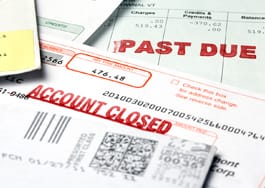
If you have a lot of debt, your phone may be ringing off the hook. That can be frustrating and emotionally draining. It’s important to understand that you have rights in these situations. If you are currently being harassed by debt collectors, here’s what you need to know.
1. Debt Collectors Tend to Work on Commission
If someone is bothering you, it can help to understand a little bit about their motives. When it comes to debt collectors, they generally work on commission. The more money they collect, they more they bring home at the end of the month.
This is why it’s often personal for the debt collectors, and it explains why they may be calling you incessantly and really badgering you to pay your bills.
2. You Are Protected by the Fair Debt Collection Practices Act
However, whether they are eager to get big commission checks or not, collectors are not allowed to harass you. As a consumer, you are protected by the FDCPA. This is a collection of laws that outline what bill collectors are not allowed to do. The laws cover everything from where collectors can call you, to whom they can speak to about your debts, to your right not to be harassed.
3. You Can Report Harassment
If a debt collector is harassing you, consider reporting them to the Consumer Financial Protection Bureau. This is a national agency that helps to protect your rights. You may want to take notes on what happened so that you can file a detailed report. On top of that, you may also want to contact the attorney general in your state.
To register a complaint with the attorney general in Indiana, go the official state website, select File a Complaint from the menu on the left side of the page, and then select Consumer Complaint. At this point, a short form will come up. You simply need to fill in the requested details along with some contact information.
4. You Can Verbally Cease Calls to Your Work
If a debt collector is calling you at work, you can stop that easily. Just tell the collector to cease and desist from calling that number. If you want, you can go into detail and share that you will get in trouble if you get personal calls at work.
However, you are not obligated to do that. Under the law, you can simply tell them to stop calling you at work, and if they don’t, they are in breach of the law.
5. You Must Write a Letter to Cease Calls to Your Home
Unfortunately, you cannot verbally cease a debt collector from calling your home. Luckily, it’s pretty straightforward to write a cease and desist letter. Find the placement letter – that’s the letter the collection agency must send you to notify you that the debt has been placed with their office – and send your letter to the address on that notice.
Your letter simply needs to say that you want the collection agency to cease and desist from calling you at home. So that the company can identify you, you should include your name, the amount of your debt, and the original creditor. Once the collection agency receives the cease and desist notice, they can call you one last time to let you know which actions they plan to take.
However, this cease and desist only applies to that particular collection agency. If that agency sends your debt to another agency, those collectors can call your home until you draft another cease and desist letter to that agency.
If you are overwhelmed with debt and collectors seem to be calling you all day long, you may want to consider bankruptcy. When you file bankruptcy, the courts immediately issue a stay, and at that point, your creditors can no longer contact you or pursue collection actions. To learn more, contact Lynch & Belch P.C. today.


